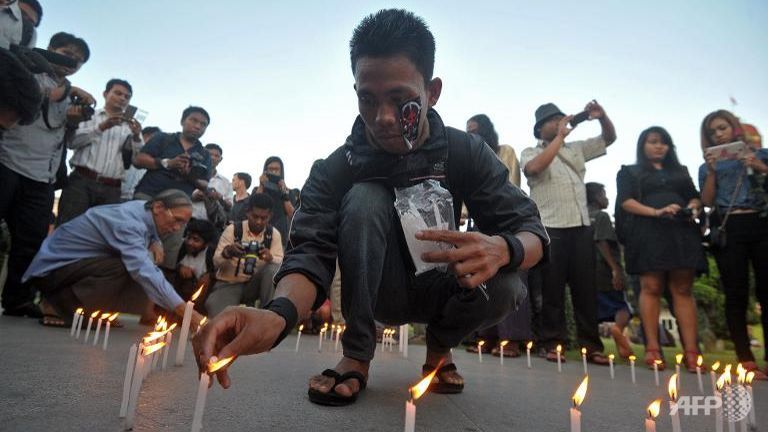UN says aid to parts of Myanmar's rebel-held north 'stalled'

Myanmar activists light candles in memory of the deaths of over 20 people in northern Kachin state,
during a ceremony in Yangon, on Nov 24, 2014. (AFP/Soe Than WIN)
YANGON: The United Nations on Tuesday (Dec 16) said it had been unable to reach thousands of displaced people in rebel-held areas of Myanmar's war-torn northern Kachin state for two months as soaring tensions after recent clashes raise international alarm.
Convoys which have provided aid for up to 30,000 people in near-monthly runs for over a year have been unable to cross into areas outside of government control since September, according to the UN's November humanitarian bulletin.
"This is mainly due to the volatile security situation and bureaucratic delays in getting government authorisations," said the report by the UN's Office for the Coordination of Humanitarian Affairs (OCHA), released on Tuesday.
It comes after an upsurge of fighting between government troops and ethnic Kachin rebels in the region. Food deliveries by the World Food Programme have been halted, the UN said, adding that local aid groups were trying to plug the most urgent gaps in assistance.
It also warned that some 27,500 displaced people, including 12,000 vulnerable children, had not been provided with blankets and warm clothes as the cold winter season sets in.
Heavy fighting in Kachin, near the border with China, broke out in November following a deadly surprise artillery attack by the army on a Kachin Independence Army (KIA) training camp.
The UN and United States were among those to call for civilians to be protected in response to the clashes, which have cast further doubt over faltering nationwide peace talks.
Some 98,000 people have been displaced in Kachin and northern areas of neighbouring Shan state since a 17-year ceasefire splintered in 2011. Around half of those left homeless are in areas outside of government control, the UN said.
"The United Nations and its partners continue to call for regular and sustained humanitarian access to all displaced people and other communities affected by the conflict," the report added.
Some 14 of the 16 major rebel groups have signed ceasefire agreements with the quasi-civilian government as part of reforms in recent years. But deals with the KIA and the Ta'ang National Liberation Army in the eastern state of Shan have proved elusive.
What the stars mean:
★ Poor ★ ★ Promising ★★★ Good ★★★★ Very good ★★★★★ Exceptional
Latest News
More News
- Foreign leaders extend congratulations to Party General Secretary To Lam (January 25, 2026 | 10:01)
- Russian President congratulates Vietnamese Party leader during phone talks (January 25, 2026 | 09:58)
- Worldwide congratulations underscore confidence in Vietnam’s 14th Party Congress (January 23, 2026 | 09:02)
- Political parties, organisations, int’l friends send congratulations to 14th National Party Congress (January 22, 2026 | 09:33)
- 14th National Party Congress: Japanese media highlight Vietnam’s growth targets (January 21, 2026 | 09:46)
- 14th National Party Congress: Driving force for Vietnam to continue renewal, innovation, breakthroughs (January 21, 2026 | 09:42)
- Vietnam remains spiritual support for progressive forces: Colombian party leader (January 21, 2026 | 08:00)
- Int'l media provides large coverage of 14th National Party Congress's first working day (January 20, 2026 | 09:09)
- Vietnamese firms win top honours at ASEAN Digital Awards (January 16, 2026 | 16:45)
- ASEAN Digital Ministers' Meeting opens in Hanoi (January 15, 2026 | 15:33)
















 Mobile Version
Mobile Version